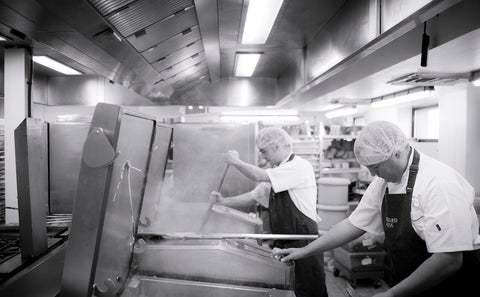Have chef shortages hit a record high in the UK? The Guardian reports 21% rise in production chef shortfalls.
Industry Challenges
Chef shortages rise 10% for head chefs and 21% for production chefs. What does this mean? It means the average salary for chefs will rise in an increasingly competitive market. Contrary to what we’ve been taught, the real production cost in a kitchen is labour.
In a recent thought piece, Zupa CEO Ollie Brand shared his thoughts on hospitality’s challenges for the year ahead: Supply chain fragility, staff shortages and inflationary pressures. “Most of our hospitality customers are saying the same thing; finding good people who are passionate and committed to the industry, as opposed to those more transactional ‘career jumpers’, remains challenging”.
A shrinking talent pool
The Guardian reports “The job vacancy rate in the sector is already high at 8% – about 120,000 roles unfilled – and the shortfall rises to as much as 10% for head chefs and 21% for production chefs, the worker bees who keep dishes flowing in high-volume kitchens and factories”.
With a shortage of skilled chefs within the UK, many restaurants and hotels look abroad to fill vacancies. However, policy changes underway plan to “cut migration by 300,000 a year, the minimum salary requirement for a skilled worker visa will increase from £26,200 to £38,700 from April”.
Restaurant online reports that the proposed immigration policy will “further shrink the talent pool that the entire economy will be recruiting from, and only worsen the shortages hospitality businesses are facing”.
How much does a chef cost in 2024?
Our research shows that the hourly rate for a commis chef ranges from £11.44 to £18.00. In the luxury hotel sector, the average annual salary sits at around £33 000 per annum for a commis chef and £40 000 for a sous chef, going as high as £58 000 for a highly skilled executive sous chef.
With such a competitive market for skilled chefs, some restaurants offer salaries up to £22.00 per hour. In addition to higher salaries, hotels and restaurants offer their chefs free drinks and meals, discounted hotel rates or even complimentary stays, paid wellness days, free life insurance, and even dental plans.
How to cut labour cost and optimise efficiency
With inflated labour costs, restaurants and hotels need to manage production costs efficiently. This means reducing chef hours where possible, and ensuring skilled chefs don’t waste their time with labouring tasks, like preparing the staff meal every day.
Ollie Brand highlights the need for operational efficiency: “Admin must be automated where possible to free up time and resources in a world still stifled by people shortages and rising operational costs.”
Outsourcing a few menu items can reduce hours spent on procurement, mise en place, slow-cooking, and stock management. Especially during peak season, using a high quality prepared ingredient, like Thai Green Curry Sauce for example, can drastically reduce the number of prep chefs required on site, and your overall production costs.








Comments (0)
There are no comments for this article. Be the first one to leave a message!